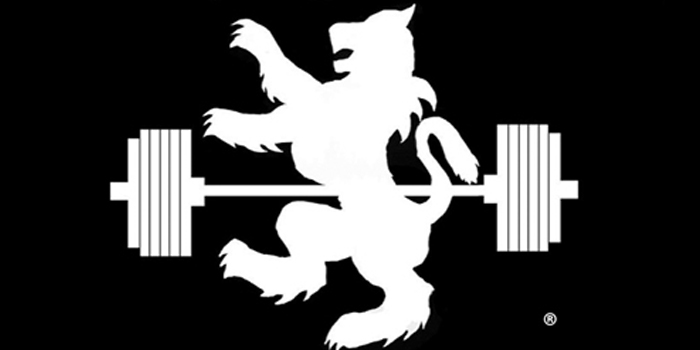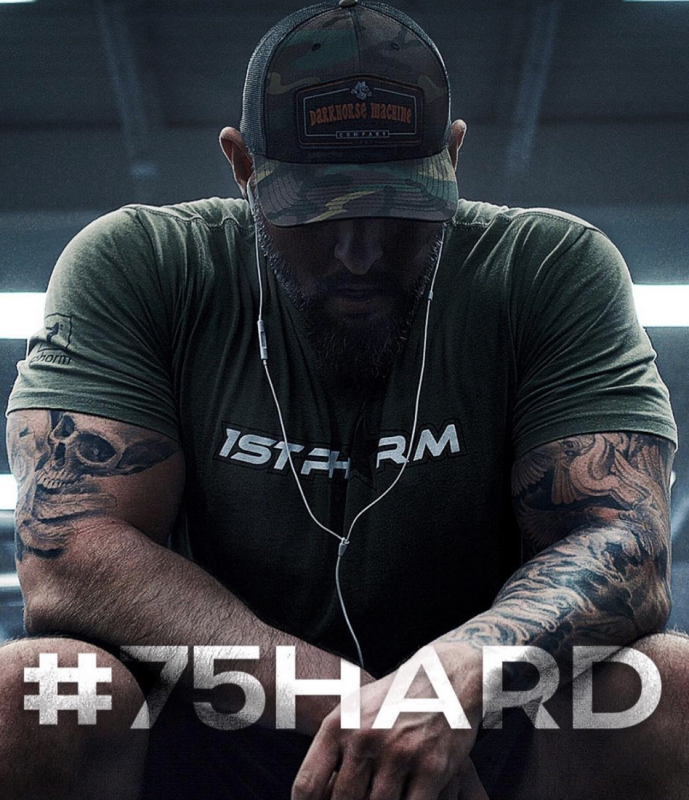
"#75HARD" — Andy Frisella
Several years ago, I spoke to an editor at elitefts and told him I thought they were publishing too many articles per week — imagine that, posting too much content. At the time, I meant it. I thought my advice was sound. In retrospect, I may have been projecting my frustrations at not having the discipline to schedule more time to read.
While it’s true, I don’t prioritize the time to read as much as I should (I’m getting better, but we’ll get to that part), I devour good content from time to time and stumbled upon a gem written by Matt Ladewski in mid-June — “4 Non-Training Podcasts You Should Listen To.”
RECENT: 3 Don'ts for the Early Deadlifter
Now, I don’t want to pound my chest, but I also wrote an article that was podcast-centric for elitefts several years ago — “How Joe Rogan Saved My Life.” That article was met with a lukewarm reception. The reader’s comment that stuck with me the most was, “I think this is an all-time low for an elitefts article … I don’t know how this made it past the filter.” Wait, there’s a filter? I was so misunderstood. My children still surface that comment periodically to laugh at my expense, but I digress.
I don’t know Ladewski personally, although I think we met at the elitefts S5 Compound several years ago. I have picked up some great tips from his writing over the years and, as it turns out, “4 Podcasts” was no exception. I am not going to regurgitate Matt’s article, but it suffices to say he recommends four non-training related listens (two of which were already on my list, as were a few of his honorable mentions near the end of the article).
The podcast that drew most of my attention was The MFCEO Project, a podcast that Dave Tate initially recommended to Matt, and now a listen that I have recommended multiple times over. Hosted by Andy Frisella, the CEO of 1st Phorm Supplements, it is technically a business podcast, but I have found it to be so much more — it is an instructional on mental toughness, gaining confidence, realizing your self-worth, and achieving your full potential.
I have listened to several dozen episodes of The MFCEO Project and found them all to be motivational, but I would recommend you start with “75HARD: A 75-Day Tactical Guide for Winning the War with Yourself — MFCEO290.”
In this episode, Andy discusses his obsession with the study of mental toughness and the development of mental toughness. In conjunction with his podcast and his associated mentorship, Andy had contemplated a way to help others develop this specific skill. Mental toughness is a skill you can cultivate, although society incorrectly teaches it is a character trait — any individual can acquire and nurture it, in contrast to antiquated erroneous beliefs.
Andy devised a program he termed 75HARD, which is a mental and physical challenge designed to push yourself outside of your comfort zone to develop confidence, self-esteem, self-worth, resilience, perseverance, and grit. The program includes five tasks that must be completed each day for 75 days straight with no compromises, no excuses, and absolutely no substitutions.
As I type this, I am 21 days into the program (54 days remaining). I have shaved off 15 pounds, my body is sore, but functioning, and I have learned a lot about my mental discipline and myself in a relatively short amount of time — more details to follow.
The #75HARD Program:
1. Follow a diet. You should align the diet with your goals — with zero deviation. You cannot indulge in a single cheat meal — emphasis on zero deviation and no alcohol.
The diet I utilize is a modified ketogenic diet coupled with some calorie restriction. I try and keep my intake of carbohydrates under 100 grams a day — zero junk food, zero fast food, and no bread. My staples are steak, chicken, salads, and a variety of nuts — almonds, cashews, and a healthy amount of macadamia nuts.
Over the last 21 days, I learned more about my eating habits and estimate that nearly 50 percent of my eating has been habit-based versus hunger-based.
I am not a big drinker, but I enjoy a beer or two after a long week at the office or while swimming or relaxing outside. Refraining from a single drink has been more challenging than I initially thought it would be, particularly with a case of Bud Light staring me down each time I open the fridge.
2. Work out twice a day for a minimum of 45 Minutes (one must be outside). The type of workout doesn’t matter, and one of the workouts must be outdoors. The point of doing it outdoors is that you can’t control the circumstances and you still must do it. Don’t make excuses about the conditions you can’t control. Like the U.S. Marines, you must adapt and overcome.
RELATED: 4 Non-Training Podcasts You Should Listen To
Before starting this program, I had reduced my training frequency to two to three times per week, with no cardio-based training. Changing from two to three sessions per week to 14 is a significant increase, and I have incorporated walking (with and without chains draped over my shoulders, in place of a weighted vest) and swimming laps.
Like Andy, I enjoy weight training, and my more intense lifting sessions can run 90 minutes long, which I only count as a single workout (following the program to the letter of the law). I feel my general physical preparedness improving and am excited about the prospects of this program.
3. Drink one gallon of water per day. To be successful, you need to be able to execute simple things. Drinking a gallon of water each day is healthy and something simple you should do for the rest of your life.
There are many health benefits to maintaining optimal hydration. It helps maximize physical performance as water comprises approximately 80 percent of muscle. In addition to cushioning the brain, spinal cord, and other connective tissues, hydration can have a significant effect on energy levels and brain function, as even mild dehydration can have detrimental effects on mood, memory, and brain performance.
Lastly, water can assist in weight loss by increasing the feeling of satiety as well as metabolic rate.
Initially, I thought this was going to be challenging. A gallon of water, on the surface, feels like a formidable amount, but this part of the program has been easy for me. With the multiple workouts a day, downing 64 or more ounces during training alone is not hard, and I frequently drink 64 to 80 ounces of water before leaving for work in the morning. The key is to maintain the discipline to prioritize your rehydration — be mindful of the simplest things that can produce results.
4. Read 10 pages minimum of a personal development book. The key here is to choose a book that will improve your life — a personal development book, an entrepreneurship book — anything that will teach you something beneficial. This discipline will help form a habit that will add to your knowledge base.
During the podcast, Andy speaks about Tim S. Grover, referring to him as the best mental toughness expert and coach ever. I decided to heed Andy’s recommendation and chose RELENTLESS — From Good to Great to Unstoppable, as my first read. Tim doesn’t sugarcoat any of his advice, and there are many interesting nuances in this book, particularly if you are a fan of athletics or Michael Jordan in particular.
"Believe this: Everything you need to be great is already inside you. All your ambitions and secrets, your darkest dreams ... they're waiting for you to just let go." — Tim S. Grover
READ MORE: The Most Important Training Article You Will Read This Year
5. Take a daily progress picture. This picture will serve as a reminder of what you have done physically throughout the program. It is easy to do, so I’m not going to spend any time on this, but I snap my picture as soon as I wake up in the morning and immediately check it off the list.
"If you follow this program for 75 days, you are going to be looking pretty fucking happy in that progress picture." — Andy Frisella

What #75HARD Has Taught Me Through the First Third of the Program:
1. I have been lying to myself about the amount of time I have available during a given day. When I first considered this program, I was adding additional time requirements. Each day, considering the workouts and the reading, I would need to find two hours that I didn’t believe I had (90 minutes for training and 30 minutes for the active reading).
Twenty-one days in, I have managed to find the time each day with no perceptible slippage in other areas of my life — absolutely incredible!
2. You must pay yourself first (the value in prioritization). Much like how you should have been taught in your financial life, you must pay yourself first (i.e., before allocating money available for bills and spending, if you are able, you should be socking away what you can for both retirement and future goals).
Concerning this program, it requires you to make time for your betterment. If you don’t make these items a priority, you are not going to be able to complete this program for days straight.
I try to ensure I have knocked off the Progress Picture, the first workout, and at least 64 ounces of water before leaving the house in the morning for work. I need to wake up earlier than was the norm to accomplish it, but I have the will power to focus and consistently complete these tasks.
3. I was eating a lot out of habit. I didn’t realize this before starting the program. In the early onset, I can’t emphasize enough how many times I walked over to the pantry to grab a snack only to realize I can’t eat this junk because of the program and because I am not even truly hungry. It’s like when your power goes out, but each time you enter a different dark room, you flip on the light switch; it is all habit we have ingrained over time.
4. Working toward your goal (or goals) each day, without exception, is an essential part of achieving success. I have to admit that each day when I completed the program requirements, I experienced a moment of elation — I know I have done the work to improve my mental-toughness-game. The euphoria is brief. The harsh reality is I need to do it all over again tomorrow; the completion of this program requires the highest level of diligence and dedication.
Achieving any worthwhile goal requires a similar rigor, which is a primary reason I believe this program is tremendous for honing mental preparedness and grit.
5. In conquering this mental game, I like who I am becoming. This program is altering the way I think and precisely what I think I can accomplish. It is incredibly empowering to realize you can complete a no-compromise and no-excuse program that you and I have the mental fortitude to accomplish difficult challenges.
Most of the things Andy mentions I had already considered or employed at various points in my life, but for different reasons they had not become the habits that, once entrenched, will help me reach my full potential.
Stop saying you will start tomorrow.
Take control of your life now.










